Expanding Healthcare Access: Biden-Harris Administration’s $100 Million Workforce Investment
To address critical shortages in the U.S. healthcare workforce, the Biden-Harris administration recently announced a substantial investment of nearly $100 million to expand the number of healthcare providers, including nurses, nurse practitioners, physicians, and behavioral health professionals. This funding, administered through the Health Resources and Services Administration (HRSA), will be used to recruit and train healthcare professionals in underserved communities, offering significant growth in job opportunities for healthcare providers across various fields.
Key elements of this initiative include over $19 million dedicated to increasing the nursing workforce in acute and long-term care settings, as well as nearly $12 million aimed at boosting the number of primary care physicians in high-need areas like rural and tribal communities. Additionally, the funding will enhance behavioral health services by providing more than $63 million to train peer support specialists and community health workers to support families impacted by the opioid crisis. Pediatric care will also benefit from an additional $4.6 million aimed at integrating mental health services into pediatric practices.
Strengthening the Nursing Workforce
A significant portion of the funding—over $19 million—is allocated to expanding the nursing workforce, particularly in acute and long-term care settings. This initiative is expected to increase the number of qualified nurses, which includes nurse practitioners (NPs) who can provide a range of services in both primary and specialty care. Nurse practitioners play an especially vital role in delivering primary care services, often serving as the primary healthcare provider in rural and underserved areas. This push to increase their numbers will create more job openings, ensuring that communities lacking healthcare access receive the support they need.
More Opportunities Await for APPs and Physicians
With nearly $12 million directed toward boosting the number of primary care physicians, this funding is also aimed at placing more doctors in high-need areas such as rural and tribal communities. In addition to physicians, the growing demand for Advanced Practice Providers (APPs) like nurse practitioners and physician assistants (PAs) will see a rise in job openings, as they are critical in providing accessible primary care. APPs can fill gaps in healthcare services, often performing roles traditionally held by physicians, making their recruitment a priority in high-need regions.
Addressing Behavioral Health Needs Amid the Opioid Crisis
Another key focus of the funding is addressing the mental health needs of families impacted by the opioid crisis. Over $63 million has been allocated to train peer support specialists, behavioral health workers, and other community-based providers. This is especially critical given the rising demand for mental health services. Psychiatric nurse practitioners (PMHNPs), PAs, and other mental health providers will play an essential role in supporting children and families affected by substance use disorders. This aspect of the funding presents a wealth of opportunities for professionals specializing in mental and behavioral health to find employment in both clinical and community settings
Find Your Perfect Healthcare Job with Momentum
At Momentum, we specialize in healthcare recruitment and are excited to connect qualified professionals with the many opportunities generated by this new federal initiative. Whether you’re a nurse practitioner, physician, physician assistant, or behavioral health provider, we have a wide range of job openings that align with the areas covered in this article, including primary care, mental health, telemedicine, and underserved community placements. We’re dedicated to helping healthcare providers find fulfilling roles that make a real impact. Explore our latest opportunities and let us help you take the next step in your healthcare career.
Sources:
voice.ons.org
hhs.gov
openai.com










Recent Comments